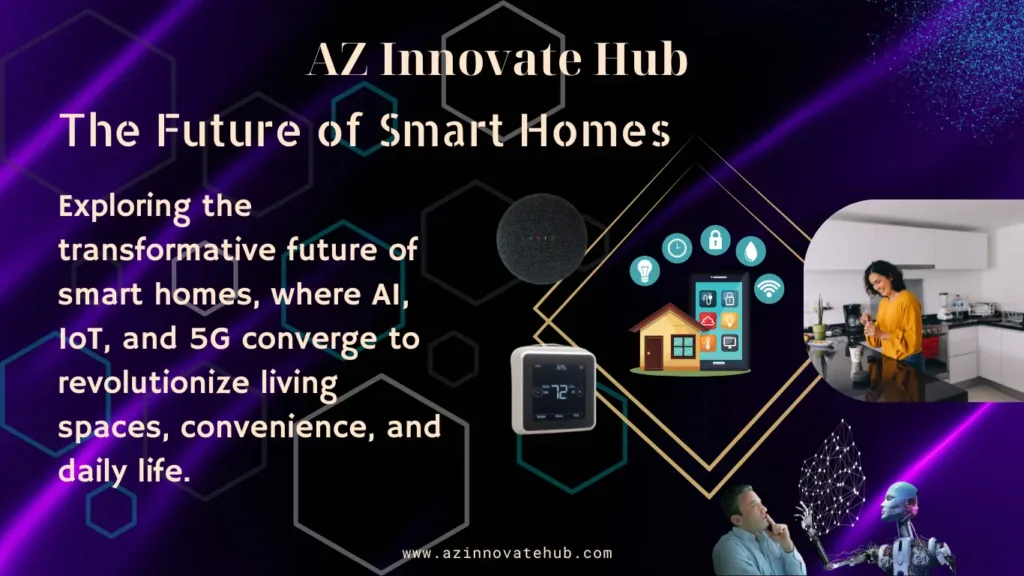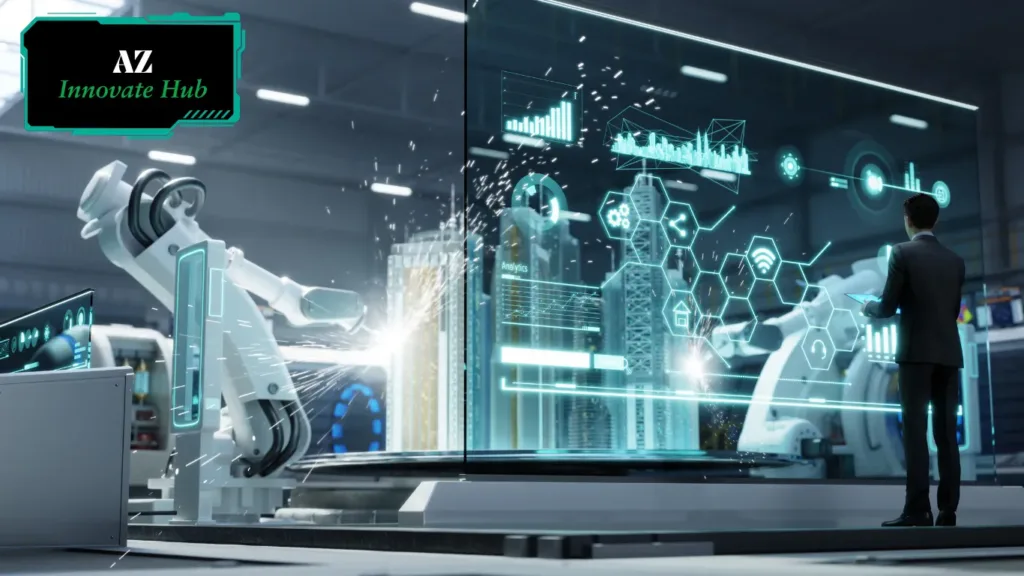
Future of Smart Home
The domestic landscape in undergoing a seismic shirt, fueled by unrelenting technological advancements. The notion of a “future of smart home” has rapidly transitioned from a luxury to a staple. Today, our living spaces are becoming increasingly interconnected, intelligent, and responsive to our needs.
From intuitive voice assistants to automated systems optimizing energy efficiency, smart home technology is revolutionizing the way we interact with our environments. The convergence of artificial intelligence, the Internet of Things (IoT), and machine learning is driving this revolution, promising a future where homes evolve from passive spaces to dynamic, interactive ecosystems.
As we stand at the threshold of this new era, it’s essential to explore the transformative potential of smart home technology and its far-reaching implications. This article delves into the key trends, innovations, and challenges shaping the future of intelligent living, examining the benefits, complexities, and ethical considerations surrounding this rapidly evolving field.
Key Insights
- Personalized Living: Future Smart home will adapt to our unique needs and preferences, crafting living environments that are truly personalized and comfortable.
- Energy Efficiency: Advanced energy management systems and renewable energy integration will help reduce our carbon footprint and lower energy costs, paving the way for a more sustainable future.
- Health and Wellness: Smart homes will prioritize our health and well-being, providing personalized health insights and creating optimal living conditions that promote healthy living.
- Security and Convenience: Biometric security systems and AI-powered assistants will enhance security and convenience, making our homes safer and more efficient.
The Evolution of Smart Homes: From Basic Automation to Intelligent Living
The Future of smart homes has transitioned from a futuristic fantasy to a tangible reality, transforming the way we live, interact, and experience our living spaces. This journey has been marked by significant technological leaps, from rudimentary automation systems to sophisticated, AI-driven homes.
Early Beginnings: Basic Automation (1960s-1980s)
The seeds of smart home technology were planted in the mid-20th century, with early automation systems controlling fundamental functions like lighting and temperature. These pioneering systems relied on wired connections and complex programming, laying the groundwork for future innovations.
Home Automation Takes Shape (1990s-2000s)
The 1990s and 2000s witnessed substantial advancements in home automation. Standardized protocols like X10 and Z-Wave enabled seamless communication between devices from different manufacturers. Wireless technologies like Zigbee and Wi-Fi further expanded the possibilities of home automation, making programmable thermostats, security systems, and remote-control devices increasingly popular.
The Rise of Voice Assistants and Smart Speakers (2010s)
The 2010s marked a significant turning point, with the emergence of voice-activated assistants like Amazon Alexa and Google Assistant. These devices revolutionized the way we interact with our homes, allowing us to control various functions with simple voice commands. The proliferation of smartphones accelerated the adoption of smart home technology, enabling remote monitoring and control.
The Era of AI, IoT, and Machine Learning (2020s and Beyond
The current decade is witnessing an unprecedented surge in smart home technology, driven by the convergence of artificial intelligence (AI), the Internet of Things (IoT), and machine learning. This synergy has given rise to:
- AI-Powered Personalization: AI algorithms analyze user behavior and preferences to tailor the home environment. Smart thermostats, for instance, can learn individuals comfort levels and adjust temperature settings accordingly.
- IoT-Enabled Connectivity: The IoT enables seamless communication between diverse devices, creating a cohesive and interconnected smart home ecosystem. Smart sensors monitor various parameters, providing real-time data for informed decision-making.
- Machine Learning for Predictive Insights: Machine learning algorithms analyze historical data to predict future trends and optimize performance. Smart appliances can anticipate maintenance needs, while smart energy systems optimize energy consumption based on usage patterns.
- 5G & Beyond: The advent of 5G and future generations of wireless technology will further enhance the capabilities of smart homes. Low-latency, high-bandwidth connections will enable real-time control, seamless streaming, and advanced applications like augmented reality and virtual reality.
As we move forward, the future of smart homes promises to be even more exciting. Continuous advancements in technology will lead to increasingly sophisticated and personalized living spaces, redefining the boundaries of what is possible and ushering in a new era of intelligent living.
The Future of Smart Homes: Where Technology Meets Serenity

A place where technology seamlessly integrates with your daily life, making every moment more enjoyable, efficient, and secure. This is the promise of future of smart home.
Personalized Sanctuaries
- Your Personal AI Concierge: Voice-activated assistants like Alexa and Google Home are just the beginning. Future AI-powered companions will learn your habits, preferences, and routines, adjusting the ambience, temperature, and lighting to create a space that’s uniquely yours.
- Adaptive Environments: Smart homes will intuitively adapt to your changing moods and activities. Whether you’re relaxing, entertaining, or working, the lighting, temperature, and atmosphere will adjust to create the perfect setting.
- Biometric Security: Advanced biometric security systems, including fingerprint scanners, facial recognition, and voice recognition, will provide an additional layer of protection, ensuring that only authorized individuals can access your home.
Sustainable Living
- Smart Energy Management: Advanced energy management systems will analyze your energy consumption patterns, identify areas of inefficiency, and optimize energy usage. You’ll be able to monitor and control energy consumption remotely, reducing your carbon footprint and utility bills.
- Renewable Energy Integration: Future of Smart homes will harness the power of nature, integrating renewable energy sources like solar panels and wind turbines to reduce reliance on traditional power grids.
- Predictive Maintenance: Smart appliances will be equipped with sensors that monitor performance and predict potential issues, extending their lifespan, reducing repair costs, and minimizing downtime.
Wellness and Self-Care
- Remote Health Monitoring: Wearable devices and smart home sensors will track vital signs, sleep patterns, and activity levels, providing valuable insights into your overall health. Remote health monitoring will enable early detection of health issues and timely intervention.
- Personalized Wellness: AI-powered health and wellness platforms will analyze your health data, providing personalized recommendations for diet, exercise, and stress management. Your smart home will create an optimal environment for relaxation and rejuvenation.
- Air Quality Control: Smart air purifiers and ventilation systems will monitor indoor air quality, removing pollutants, allergens, and harmful gases to ensure a healthy and comfortable living environment.
Immersive Entertainment
- Virtual and Augmented Reality: The future of entertainment will be immersive, with virtual and augmented reality technologies transforming the way you experience movies, games, and social interactions. Your smart home will seamlessly integrate these technologies, creating captivating and personalized entertainment experiences.
- Seamless Integration: Smart devices and entertainment systems will work together effortlessly, creating a cohesive and enjoyable experience. AI-powered recommendation systems will suggest content based on your preferences, while voice-activated controls will allow you to navigate and control your entertainment systems with ease.
Advanced Gaming and Streaming: High-speed internet connections, advanced gaming consoles, and high-definition displays will elevate gaming and streaming experiences. Your smart home will optimize network connectivity, providing the ideal environment for gaming and entertainment.
As we embark on this exciting journey, it’s essential to prioritize privacy, security, and ethical considerations. By striking a balance between technological innovation and human values, we can create a future where smart homes enhance our lives without compromising our well-being.
Navigating the Complexities of the Smart Home Revolution
As we embark on the smart home journey, it’s essential to confront the challenges and ethical considerations that accompany this technological leap. While smart homes promise unparalleled convenience, efficiency, and innovation, they also raise critical concerns about privacy, security, and social responsibility.
The Privacy and Security Conundrum
The vast amounts of personal data generated by smart homes create a pressing need for robust privacy and security measures. Key concerns include:
- Data Breaches: Sensitive information falling into the wrong hands can have devastating consequences.
- Unauthorized Access: Vulnerabilities in smart home systems can be exploited by malicious actors, compromising privacy and security.
- Surveillance and Monitoring: The use of AI-powered surveillance systems and IoT devices raises concerns about potential privacy infringements.
To mitigate these risks, it’s crucial to implement robust data protection measures, strong encryption, and regular software updates.
The Ethical Implications of AI and IoT
The integration of AI and IoT in smart homes raises important ethical questions:
- Bias and Discrimination: AI algorithms can perpetuate biases and discrimination if they’re trained on biased data or designed with inherent biases.
- Autonomy and Control: The increasing reliance on AI and IoT can lead to a loss of autonomy and control over our homes.
- Job Displacement: As smart homes become more automated, there’s a risk of job displacement in industries like home maintenance and repair.
To address these ethical concerns, it’s vital to develop guidelines and regulations that promote responsible and ethical development of AI and IoT technologies.
The Need for Interoperability and Standardization
A significant challenge in the smart home ecosystem is the lack of universal standards and protocols. This can lead to:
- Fragmentation: Different devices and systems from various manufacturers may not be compatible, hindering seamless integration.
- Incompatibility: Incompatible devices can limit functionality and create a fragmented user experience.
- Limited Functionality: The absence of standardized protocols can restrict the potential of smart home systems.
To overcome these challenges, industry-wide efforts are necessary to establish universal standards and protocols that promote interoperability and seamless integration of devices from different manufacturers.
By acknowledging and addressing these challenges and ethical considerations, we can unlock the full potential of smart home technology while ensuring a secure, equitable, and sustainable future.
Conclusion: Embracing a Brighter Future for Smart Homes
As we’ve navigated the vast possibilities of smart home technology, one thing is clear: the future is bright, and the potential is vast. From tailored living spaces to cutting-edge energy management systems, the benefits of smart home innovation are undeniable.
Harnessing the Power of Smart Home Technology
By embracing this innovation and addressing the challenges that come with it, we can create a future of smart homes elevate our quality of life, foster sustainability, and bring people together in a more connected and convenient world.
A Collective Responsibility
As we move forward to future of smart homes, it’s essential that we work together to shape the future of smart homes. As consumers, we can make informed decisions about the devices we bring into our homes. As businesses, we can innovate and develop smart home solutions that are user-friendly, secure, and interoperable. And as a society, we must prioritize ethical considerations, data privacy, and sustainability in the development and deployment of smart home technologies.
By collaborating and embracing our collective responsibility, we can create a future where smart home technology empowers us to live healthier, happier, and more sustainable lives.

